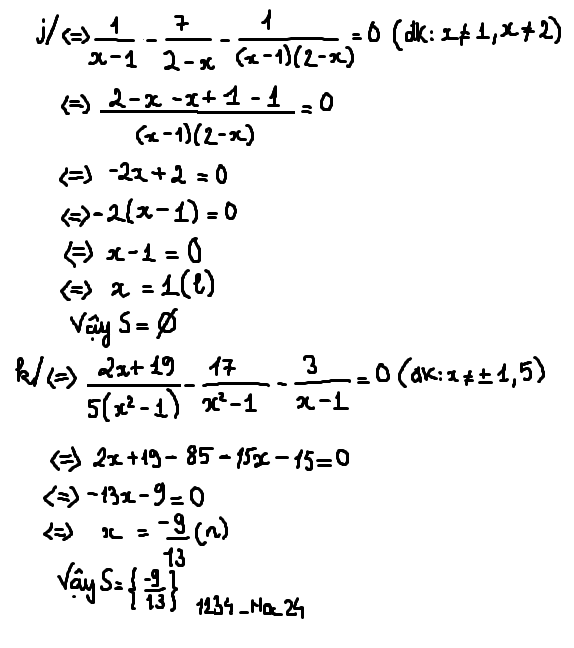Giải phương trình: \(\dfrac{x^2+1}{x} + \dfrac{x}{x^2+1}=\dfrac{5}{2} \)

Những câu hỏi liên quan
Giải bất phương trình:
\(\dfrac{1}{x^2}+\dfrac{x^2}{1-x^2}+\dfrac{5}{2}\left(\dfrac{\sqrt{1-x^2}}{x}+\dfrac{x}{\sqrt{1-x^2}}\right)+2>0\)
Giải phương trình:
\(\dfrac{x+1}{x-2}-\dfrac{5}{x+2}=\dfrac{12}{x^2-4}+1\)
ĐKXĐ: \(x\ne\pm2\)
\(\dfrac{x+1}{x-2}-\dfrac{5}{x+2}=\dfrac{12}{x^2-4}+1\\ \Leftrightarrow\dfrac{\left(x+1\right)\left(x+2\right)}{\left(x-2\right)\left(x+2\right)}-\dfrac{5\left(x-2\right)}{\left(x+2\right)\left(x-2\right)}=\dfrac{12}{\left(x+2\right)\left(x-2\right)}+\dfrac{\left(x+2\right)\left(x-2\right)}{\left(x+2\right)\left(x-2\right)}\\ \Leftrightarrow\left(x+1\right)\left(x+2\right)-5\left(x-2\right)=12+\left(x+2\right)\left(x-2\right)\\ \Leftrightarrow x^2+x+2x+2-5x+10=12+x^2-4\\ \Leftrightarrow-2x=-4\\ \Leftrightarrow x=2\left(ktm\right)\)
Vậy \(S\in\left\{\varnothing\right\}\)
Đúng 4
Bình luận (0)
ĐKXĐ: \(\begin{cases}x-2\ne 0\\x+2\ne 0\end{cases}\leftrightarrow x\ne 2\\x\ne -2\end{cases}\)
\(\dfrac{x+1}{x-2}-\dfrac{5}{x+2}=\dfrac{12}{x^2-4}+1\)
\(\leftrightarrow \dfrac{(x+1)(x+2)}{(x-2)(x+2)}-\dfrac{5(x-2)}{(x+2)(x-2)}=\dfrac{12}{(x-2)(x+2)}+\dfrac{(x-2)(x+2)}{(x-2)(x+2)}\)
\(\to x^2+3x+2-5x+10=12+x^2-4\)
\(\leftrightarrow x^2-2x-x^2=12-12-4\)
\(\leftrightarrow -2x=-4\)
\(\leftrightarrow x=2(\rm KTM)\)
Vậy pt đã cho vô nghiệm \(S=\varnothing\)
Đúng 1
Bình luận (1)
Giải các phương trình sau:
\(a.\dfrac{4x-5}{x-1}=2+\dfrac{x}{x-1}\)
\(b.\dfrac{7}{x+2}=\dfrac{3}{x-5}\)
\(c.\dfrac{14}{3x-12}-\dfrac{2+x}{x-4}=\dfrac{3}{8-2x}-\dfrac{5}{6}\)
\(d.\dfrac{x+1}{x-1}-\dfrac{x-1}{x+1}=\dfrac{16}{x^2-1}\)
TK
https://lazi.vn/edu/exercise/giai-phuong-trinh-4x-5-x-1-2-x-x-1-7-x-2-3-x-5
Đúng 2
Bình luận (0)
a: \(\Leftrightarrow4x-5=2x-2+x\)
=>4x-5=3x-2
=>x=3(nhận)
b: =>7x-35=3x+6
=>4x=41
hay x=41/4(nhận)
c: \(\Leftrightarrow\dfrac{14}{3\left(x-4\right)}-\dfrac{x+2}{x-4}=\dfrac{-3}{2\left(x-4\right)}-\dfrac{5}{6}\)
\(\Leftrightarrow\dfrac{28}{6\left(x-4\right)}-\dfrac{6\left(x+2\right)}{6\left(x-4\right)}=\dfrac{-9}{6\left(x-4\right)}-\dfrac{5\left(x-4\right)}{6\left(x-4\right)}\)
\(\Leftrightarrow28-6x-12=-9-5x+20\)
=>-6x+16=-5x+11
=>-x=-5
hay x=5(nhận)
d: \(\Leftrightarrow x^2+2x+1-\left(x^2-2x+1\right)=16\)
\(\Leftrightarrow4x=16\)
hay x=4(nhận)
Đúng 0
Bình luận (0)
giải phương trình chứa ẩn ở mẫua/dfrac{5}{3}dfrac{5-3x}{2x}b/dfrac{x-4}{x+1}+dfrac{x-1}{x}2c/dfrac{x+2}{x-2}-dfrac{1}{x}dfrac{2}{xleft(x-2right)}d/dfrac{1}{x}+dfrac{3}{x+1}dfrac{2}{xleft(x+1right)}e/dfrac{x}{x-3}+dfrac{x}{x+1}dfrac{2x}{left(x-3right)left(x+1right)}f/dfrac{2}{x-3}-dfrac{4}{x+3}dfrac{5}{x^2-9}
Đọc tiếp
giải phương trình chứa ẩn ở mẫu
a/\(\dfrac{5}{3}\)=\(\dfrac{5-3x}{2x}\)
b/\(\dfrac{x-4}{x+1}\)+\(\dfrac{x-1}{x}\)=2
c/\(\dfrac{x+2}{x-2}\)-\(\dfrac{1}{x}\)=\(\dfrac{2}{x\left(x-2\right)}\)
d/\(\dfrac{1}{x}\)+\(\dfrac{3}{x+1}\)=\(\dfrac{2}{x\left(x+1\right)}\)
e/\(\dfrac{x}{x-3}\)+\(\dfrac{x}{x+1}\)=\(\dfrac{2x}{\left(x-3\right)\left(x+1\right)}\)
f/\(\dfrac{2}{x-3}\)-\(\dfrac{4}{x+3}\)=\(\dfrac{5}{x^2-9}\)
a: =>10x=3(5-3x)
=>10x=15-9x
=>19x=15
=>x=15/19
b: =>\(\dfrac{x\left(x-4\right)+x^2-1}{x\left(x+1\right)}=2\)
=>2x^2+2x=x^2-4x+x^2-1=2x^2-4x-1
=>2x=-4x-1
=>6x=-1
=>x=-1/6
c:=>x(x+2)-x+2=2
=>x^2+2x-x=0
=>x(x+1)=0
=>x=0(loại) hoặc x=-1(nhận)
d: =>x+1+3x=2
=>4x=1
=>x=1/4
e: =>x(x+1)+x(x-3)=2x
=>x^2+x+x^2-3x=2x
=>2x^2-4x=0
=>x=0(nhận) hoặc x=2(nhận)
f: =>2x+6-4x+12=5
=>-2x=-13
=>x=13/2
Đúng 0
Bình luận (0)
Giải các phương trình saua) dfrac{6x+1}{x^2-7x+10}+ dfrac{5}{x-2}dfrac{3}{x-5}b) dfrac{2}{x^2-4}-dfrac{x-1}{xleft(x-2right)}+dfrac{x-4}{xleft(x+2right)}c) dfrac{1}{3-x}-dfrac{1}{x+1}dfrac{x}{x-3}-dfrac{left(x-1right)^2}{x^2-2x-3}
Đọc tiếp
Giải các phương trình sau
a) \(\dfrac{6x+1}{x^2-7x+10}\)+ \(\dfrac{5}{x-2}\)=\(\dfrac{3}{x-5}\)
b) \(\dfrac{2}{x^2-4}\)-\(\dfrac{x-1}{x\left(x-2\right)}\)+\(\dfrac{x-4}{x\left(x+2\right)}\)
c) \(\dfrac{1}{3-x}\)-\(\dfrac{1}{x+1}\)=\(\dfrac{x}{x-3}\)-\(\dfrac{\left(x-1\right)^2}{x^2-2x-3}\)
a: ĐKXĐ: \(x\notin\left\{2;5\right\}\)
\(\dfrac{6x+1}{x^2-7x+10}+\dfrac{5}{x-2}=\dfrac{3}{x-5}\)
=>\(\dfrac{6x+1}{\left(x-2\right)\left(x-5\right)}+\dfrac{5}{x-2}=\dfrac{3}{x-5}\)
=>\(6x+1+5\left(x-5\right)=3\left(x-2\right)\)
=>6x+1+5x-25-3x+6=0
=>8x-18=0
=>8x=18
=>\(x=\dfrac{9}{4}\left(nhận\right)\)
b: Đề thiếu vế phải rồi bạn
c: ĐKXĐ: \(x\notin\left\{-1;3\right\}\)
\(\dfrac{1}{3-x}-\dfrac{1}{x+1}=\dfrac{x}{x-3}-\dfrac{\left(x-1\right)^2}{x^2-2x-3}\)
\(\Leftrightarrow\dfrac{-1}{x-3}-\dfrac{1}{x+1}-\dfrac{x}{x-3}=\dfrac{-\left(x-1\right)^2}{\left(x-3\right)\left(x+1\right)}\)
=>\(\dfrac{x+1}{x-3}+\dfrac{1}{x+1}=\dfrac{\left(x-1\right)^2}{\left(x-3\right)\left(x+1\right)}\)
=>\(\left(x+1\right)^2+x-3=\left(x-1\right)^2\)
=>\(x^2+2x+1+x-3=x^2-2x+1\)
=>\(3x-2=-2x+1\)
=>5x=3
=>\(x=\dfrac{3}{5}\left(nhận\right)\)
Đúng 1
Bình luận (1)
giải các phương trình sau
1, \(\dfrac{5x^2-12}{x^2-1}+\dfrac{3}{x-1}=\dfrac{5x}{x+1}\)
2, \(\dfrac{3}{x-5}-\dfrac{15-3x}{x^2-25}=\dfrac{3}{x+5}\)
3, \(\dfrac{-3}{x-4}-\dfrac{3-5x}{x^2-16}=\dfrac{1}{x+4}\)
1: Ta có: \(\dfrac{5x^2-12}{x^2-1}+\dfrac{3}{x-1}=\dfrac{5x}{x+1}\)
\(\Leftrightarrow\dfrac{5x^2-12}{\left(x-1\right)\left(x+1\right)}+\dfrac{3x+3}{\left(x-1\right)\left(x+1\right)}=\dfrac{5x^2-5x}{\left(x+1\right)\left(x-1\right)}\)
Suy ra: \(5x^2+3x-9=5x^2-5x\)
\(\Leftrightarrow8x=9\)
hay \(x=\dfrac{9}{8}\left(tm\right)\)
2: Ta có: \(\dfrac{3}{x-5}-\dfrac{15-3x}{x^2-25}=\dfrac{3}{x+5}\)
\(\Leftrightarrow\dfrac{3x+15}{\left(x-5\right)\left(x+5\right)}+\dfrac{3x-15}{\left(x-5\right)\left(x+5\right)}=\dfrac{3x-15}{\left(x+5\right)\left(x-5\right)}\)
Suy ra: \(6x=3x-15\)
\(\Leftrightarrow3x=-15\)
hay \(x=-5\left(loại\right)\)
Đúng 1
Bình luận (0)
2. ĐKXĐ: $x\neq \pm 5$
PT \(\Leftrightarrow \frac{3}{x-5}+\frac{3x-15}{x^2-25}=\frac{3}{x+5}\)
\(\Leftrightarrow \frac{3}{x-5}+\frac{3(x-5)}{(x-5)(x+5)}=\frac{3}{x+5}\)
\(\Leftrightarrow \frac{3}{x-5}+\frac{3}{x+5}=\frac{3}{x+5}\Leftrightarrow \frac{3}{x-5}=0\) (vô lý)
Vậy pt vô nghiệm.
Đúng 0
Bình luận (0)
3. ĐKXĐ: $x\neq \pm 4$
PT \(\Leftrightarrow \frac{-3(x+4)}{(x-4)(x+4)}-\frac{3-5x}{(x-4)(x+4)}=\frac{x-4}{(x-4)(x+4)}\)
\(\Rightarrow -3(x+4)-(3-5x)=x-4\)
\(\Leftrightarrow 2x-15=x-4\Leftrightarrow x=11\) (thỏa mãn)
Đúng 0
Bình luận (0)
Giải các phương trình saud) dfrac{1}{x-2}-dfrac{6}{x+3}dfrac{5}{6-x^2-x} e) dfrac{2}{x+2}-dfrac{2x^2+16}{x^3+8}dfrac{5}{x^2-2x+4} f) dfrac{x+1}{x^2+x+1}-dfrac{x-1}{x^2-x+1}dfrac{2left(x+2right)^2}{x^6-1}
Đọc tiếp
Giải các phương trình sau
d) \(\dfrac{1}{x-2}\)-\(\dfrac{6}{x+3}\)=\(\dfrac{5}{6-x^2-x}\)
e) \(\dfrac{2}{x+2}\)-\(\dfrac{2x^2+16}{x^3+8}\)=\(\dfrac{5}{x^2-2x+4}\)
f) \(\dfrac{x+1}{x^2+x+1}\)-\(\dfrac{x-1}{x^2-x+1}\)=\(\dfrac{2\left(x+2\right)^2}{x^6-1}\)
d: ĐKXĐ: \(x\notin\left\{2;-3\right\}\)
\(\dfrac{1}{x-2}-\dfrac{6}{x+3}=\dfrac{5}{6-x^2-x}\)
=>\(\dfrac{1}{x-2}-\dfrac{6}{x+3}=\dfrac{-5}{\left(x+3\right)\left(x-2\right)}\)
=>\(x+3-6\left(x-2\right)=-5\)
=>x+3-6x+12=-5
=>-5x+15=-5
=>-5x=-20
=>x=4(nhận)
e: ĐKXĐ: x<>-2
\(\dfrac{2}{x+2}-\dfrac{2x^2+16}{x^3+8}=\dfrac{5}{x^2-2x+4}\)
=>\(\dfrac{2}{x+2}-\dfrac{2x^2+16}{\left(x+2\right)\left(x^2-2x+4\right)}=\dfrac{5}{x^2-2x+4}\)
=>\(2\left(x^2-2x+4\right)-2x^2-16=5\left(x+2\right)\)
=>\(2x^2-4x+8-2x^2-16=5x+10\)
=>5x+10=-4x-8
=>9x=-18
=>x=-2(loại)
f: ĐKXĐ: \(x\in\left\{1;-1\right\}\)
\(\dfrac{x+1}{x^2+x+1}-\dfrac{x-1}{x^2-x+1}=\dfrac{2\left(x+2\right)^2}{x^6-1}\)
\(\Leftrightarrow\dfrac{x+1}{x^2+x+1}-\dfrac{x-1}{x^2-x+1}=\dfrac{2\left(x+2\right)^2}{\left(x-1\right)\left(x+1\right)\left(x^2+x+1\right)\left(x^2-x+1\right)}\)
=>\(\dfrac{\left(x+1\right)\left(x^2-x+1\right)\left(x^2-1\right)-\left(x-1\right)\left(x^2+x+1\right)\left(x^2-1\right)}{\left(x-1\right)\left(x+1\right)\left(x^2+x+1\right)\left(x^2-x+1\right)}=\dfrac{2\left(x+2\right)^2}{\left(x-1\right)\left(x+1\right)\left(x^2+x+1\right)\left(x^2-x+1\right)}\)
=>\(\left(x^3+1\right)\left(x^2-1\right)-\left(x^3-1\right)\left(x^2-1\right)=2\left(x^2+4x+4\right)\)
=>\(\left(x^2-1\right)\cdot\left(x^3+1-x^3+1\right)=2\left(x^2+4x+4\right)\)
=>\(2x^2+8x+8=\left(x^2-1\right)\cdot2=2x^2-2\)
=>8x=-10
=>x=-5/4(nhận)
Đúng 1
Bình luận (0)
giải các phương trình sau
1, \(\dfrac{3}{2+x}-\dfrac{x-1}{x^2-4}=\dfrac{2}{x-2}\)
2, \(\dfrac{x-5}{2x-3}-\dfrac{x}{2x+3}=\dfrac{1-6x}{4x^2-9}\)
1: Ta có: \(\dfrac{3}{x+2}-\dfrac{x-1}{x^2-4}=\dfrac{2}{x-2}\)
Suy ra: \(3x-6-x+1=2x+4\)
\(\Leftrightarrow2x-5=2x+4\left(vôlý\right)\)
2: Ta có: \(\dfrac{x-5}{2x-3}-\dfrac{x}{2x+3}=\dfrac{1-6x}{4x^2-9}\)
Suy ra: \(\left(x-5\right)\left(2x+3\right)-x\left(2x-3\right)=1-6x\)
\(\Leftrightarrow2x^2-7x-15-2x^2+6x+6x-1=0\)
\(\Leftrightarrow5x=16\)
hay \(x=\dfrac{16}{5}\)
Đúng 1
Bình luận (0)
Giải các phương trình sau:
\(j.\dfrac{1}{x-1}-\dfrac{7}{x-2}=\dfrac{1}{\left(x-1\right)\left(2-x\right)}\)
\(k.\dfrac{2x+19}{5x^2-5}-\dfrac{17}{x^2-1}=\dfrac{3}{1-x}\)
\(l.\dfrac{1}{x-1}-\dfrac{2x^2+5}{x^3-1}=\dfrac{4}{x^2+x+1}\)


















